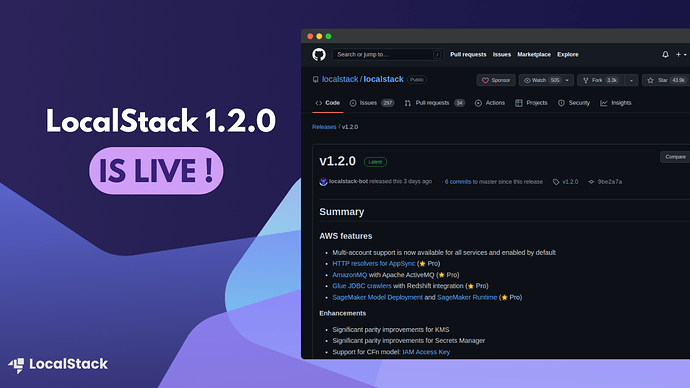We’re excited to announce the release of LocalStack v1.2.0! Over the course of this release, we have added support for various new services like Amazon MQ and Sagemaker Runtime, made significant improvements to existing services, and added new LocalStack-specific features for Cloud Pods, Persistence support, and more!
Community Release
Our Community release features new enhancements and additions to support our community users:
Multi-account support for all services
The multi-account support in LocalStack allows namespacing based on AWS Account ID. Previously, we supported only a single AWS Account ID: 000000000000. Currently, the multi-account support has now been enabled for all services in LocalStack by default. Check out the Multi-Account setup documentation to know more about this feature!
Internal SNS endpoint to access platform messages
We now offer an internal SNS endpoint to LocalStack users to access their platform messages. These messages can be accessed in JSON format at GET /_aws/sns/platform-endpoint-messages. You can specify query parameters to select and filter specific accountId, region and endpointArn. Check out our SNS documentation to know more about this feature!
Other changes and enhancements
Apart from these, the following enhancements have been rolled out:
- Significant parity improvements for KMS and Secrets Manager
- Support for CFn model: IAM Access Key
- Correctly enforcing Lambda’s 4KB environment variable size limit
Pro Release
Our Pro release features a lot of new enhancements and additions to support our Pro users:
HTTP resolvers for AppSync
We are now providing support for the following AppSync resolver types:
-
AMAZON_DYNAMODB: For accessing DynamoDB tables -
RELATIONAL_DATABASE: Accessing RDS database tables -
AWS_LAMBDA: For retrieving data from Lambda function invocations -
HTTP: For calling HTTP endpoints to fetch data -
NONE: For pass-through resolver mapping templates that return the incoming payload
Refer to LocalStack AppSync docs to know more about this feature!
AmazonMQ with Apache ActiveMQ
We have added initial support for Amazon MQ, a message broker hosting service. Currently, we offer basic APIs to be used for local development, and testing. This feature is also limited by the fact that we do not allow users to pull a specific version of a broker, and rather use only one hardcoded version and only ActiveMQ. We are continuously working to improve this feature and we would love feedback!
Glue JDBC crawlers with Redshift integration
While you are using JDBC crawlers, you now can point your crawler towards a Redshift database created in LocalStack. Check out our LocalStack Redshift docs, and LocalStack Glue docs to get started with this feature!
SageMaker Model Deployment and SageMaker Runtime
We have now added support for SageMaker Model Deployment and SageMaker Runtime. Check out the LocalStack Sagemarker docs to know how you can do model deployment, and inference and navigate to our code sample to get started.
New Cloud Pods features
To improve Cloud Pods, our new collaboration mechanism in cloud application development workflows, we have revised push/pull/inject workflows and released configurable override, merge, and deep-merge merge strategies. We have also introduced public cloud pods that are sharable across organizations. Check out our getting started guide to get started with Cloud Pods.
Other changes and enhancements
Apart from these, the following enhancements have been rolled out:
- Enhanced EKS ingress config for routing traffic to different services
- Persistence support for organizations
- Multi-accounts fully supported with persistence and cloud pods
- Enhance AWS parity for Cognito user pool auth scopes and Glue crawler table prefixes
- Allow user-specified
hostPortfor ECS containers

